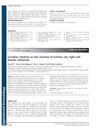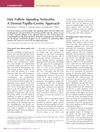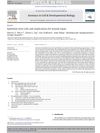The Circadian Clock in Skin
January 2015
in “Journal of Biological Rhythms”

TLDR The skin's internal clock affects healing, cancer risk, aging, immunity, and hair growth, and disruptions can harm skin health.
The document from 2015 explores the circadian clock's influence on skin biology, including its impact on stem cell functions, tissue regeneration, cancer, aging, immunity, and hair follicle regeneration. It reveals that the skin's circadian clock affects cell proliferation, DNA repair, and responses to environmental factors like UV radiation, which can lead to increased susceptibility to DNA damage and skin cancer. The clock also regulates immune functions, potentially affecting conditions like psoriasis, and plays a role in skin pigmentation and UV protection. The absence of key clock genes like Bmal1 can lead to disruptions in cell cycle regulation and increased sensitivity to UVB-induced DNA damage at night. The document also discusses the clock's influence on metabolic genes and immune cell functions, suggesting that circadian disruption could impact skin health and disease. It emphasizes the need for more research into the circadian clock's regulation within skin and its role in stem cells and regeneration, highlighting the skin as a model for studying circadian biology and the potential for chronotherapy in treating skin diseases.
View this study on europepmc.org →
Cited in this study

research The Peripheral Clock Regulates Human Pigmentation
Certain genes control the color of human hair by affecting pigment production.

research Emerging interactions between skin stem cells and their niches
Skin stem cells interacting with their environment is crucial for maintaining and regenerating skin and hair, and understanding this can help develop new treatments for skin and hair disorders.

research The Dermal Papilla: An Instructive Niche for Epithelial Stem and Progenitor Cells in Development and Regeneration of the Hair Follicle
The dermal papilla is crucial for hair growth and health, and understanding it could lead to new hair loss treatments.

research Mechanisms regulating skin immunity and inflammation
The document concludes that understanding how the skin's immune system and inflammation work is complex and requires more research to improve treatments for skin diseases.

research Circadian rhythms on skin function of hairless rats: light and thermic influences
Light and temperature affect the daily skin function rhythms in hairless rats, with temperature influencing water loss but not skin hydration.

research Stem cell dynamics in the hair follicle niche
Stem cells in the hair follicle are regulated by their surrounding environment, which is important for hair growth.

research Stem cell quiescence acts as a tumour suppressor in squamous tumours
Inactive hair follicle stem cells help prevent skin cancer.

research Hair Follicle Signaling Networks: A Dermal Papilla–Centric Approach
The document concludes that dermal papilla cells are key for hair growth and could be used in new hair loss treatments.

research The clock gene brain and muscle Arnt-like protein-1 (BMAL1) is involved in hair growth
A gene called BMAL1 plays a role in controlling hair growth.

research Local circadian clock gates cell cycle progression of transient amplifying cells during regenerative hair cycling
Hair grows faster in the morning and is more vulnerable to damage from radiation due to the internal clock in hair follicle cells.

research Epithelial stem cells and implications for wound repair
Different types of stem cells in hair follicles play unique roles in wound healing and hair growth, with some stem cells not originating from existing hair follicles but from non-hair follicle cells. WNT signaling and the Lhx2 factor are key in creating new hair follicles.

research Investigation of a non-invasive method of assessing the equine circadian clock using hair follicle cells

research Rhythmic expression of circadian clock genes in human leukocytes and beard hair follicle cells
Human leukocytes and beard hair follicle cells have internal daily clocks, and PER1 and PER3 genes may indicate individual circadian rhythms.
research Brain and muscle Arnt-like protein-1 (BMAL1) controls circadian cell proliferation and susceptibility to UVB-induced DNA damage in the epidermis
BMAL1 controls skin cell growth and UV damage risk, peaking at night.

research New Activators and Inhibitors in the Hair Cycle Clock: Targeting Stem Cells’ State of Competence
The conclusion is that Fgf18 and Tgf-ß signaling could be targeted for hair loss treatments.

research Adipocyte Lineage Cells Contribute to the Skin Stem Cell Niche to Drive Hair Cycling
Fat-related cells are important for initiating hair growth.

research Noninvasive method for assessing the human circadian clock using hair follicle cells
Scientists found a new, less invasive way to study body clocks using hair cells, which shows shift workers' body clocks don't match their lifestyles.

research β-catenin Activity in the Dermal Papilla Regulates Morphogenesis and Regeneration of Hair
β-catenin in the dermal papilla is crucial for normal hair growth and repair.
research Clock genes, hair growth and aging
Circadian clock genes are important for hair growth and may affect aging-related hair loss and graying.

research The Hair Follicle as a Dynamic Miniorgan
Hair follicles are complex, dynamic mini-organs that help us understand cell growth, death, migration, and differentiation, as well as tissue regeneration and tumor biology.

research Complex Hair Cycle Domain Patterns and Regenerative Hair Waves in Living Rodents
Mice hair growth patterns get more complex with age and can change with events like pregnancy or injury.